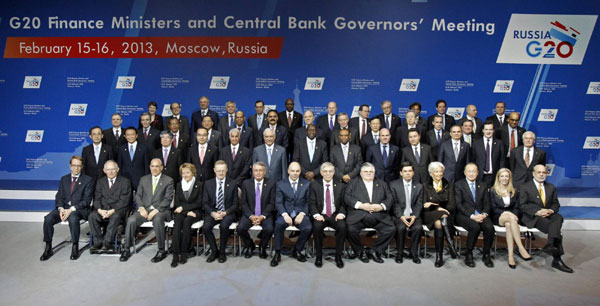G20 vows to support financial stability, sustainable growth
Updated: 2013-02-17 07:30
(Xinhua)
|
||||||||
MOSCOW - Finance ministers and central bankers of the Group of 20 (G20) on Saturday pledged to strengthen financial stability and promote sustainable growth at the conclusion of a two-day meeting here.
In a joint communique issued following the meeting, the finance officials vowed to promote more market-determined exchange rate systems and let exchange rate flexibility to reflect underlying fundamentals.
They recognized the "adverse implications" of volatile financial flows and exchange rates for economic stability, reaffirmed their commitment to refrain from competitive devaluation.
"We will not target our exchange rates for competitive purposes, will resist all forms of protectionism and keep our markets open," said the communique.
The Japanese Yen has plunged against other major currencies recently following moves by Japan's new leaders to ease monetary policy and stimulate the economy, sparking fears of a new round of "currency war."
But several high-ranking officials form major international financial institutions called the hypothetical conflicts over currencies as "rootless" and "pointless."
Angel Gurria, Secretary General of the Organization for Economic Cooperation and Development (OECD) said on the first day of the meeting that the term "currency war" was out-of-date and should not be discussed at the G20 level.
Instead of being distracted by the old jargon, today's policy makers should focus more on productivity and competitiveness, Gurria said.
International Monetary Fund (IMF) chief Christine Lagarde said that though the imbalance of economic recovery has posed pressures on various countries, the IMF review showed relevant currencies have been fairly valuated.
European Central Bank chief Mario Draghi also rebuffed the currency war rhetoric, saying exchange rates were not policy goals, but played important roles in promoting growth and stabilizing prices.
Meanwhile, the ultra-loose monetary policies adopted by major developed countries also caused concerns from their developing partners in the meeting, since currency devaluation negatively affected the export and foreign reserves of emerging economies.
Related readings:
Russia, China work through G20 for energy co-op
Putin's address on Russia assuming G20 presidency

 Li Na on Time cover, makes influential 100 list
Li Na on Time cover, makes influential 100 list
 FBI releases photos of 2 Boston bombings suspects
FBI releases photos of 2 Boston bombings suspects
 World's wackiest hairstyles
World's wackiest hairstyles
 Sandstorms strike Northwest China
Sandstorms strike Northwest China
 Never-seen photos of Madonna on display
Never-seen photos of Madonna on display
 H7N9 outbreak linked to waterfowl migration
H7N9 outbreak linked to waterfowl migration
 Dozens feared dead in Texas plant blast
Dozens feared dead in Texas plant blast
 Venezuelan court rules out manual votes counting
Venezuelan court rules out manual votes counting
Most Viewed
Editor's Picks

|

|

|

|

|

|
Today's Top News
Boston bombing suspect reported cornered on boat
7.0-magnitude quake hits Sichuan
Cross-talk artist helps to spread the word
'Green' awareness levels drop in Beijing
Palace Museum spruces up
First couple on Time's list of most influential
H7N9 flu transmission studied
Trading channels 'need to broaden'
US Weekly

|

|








